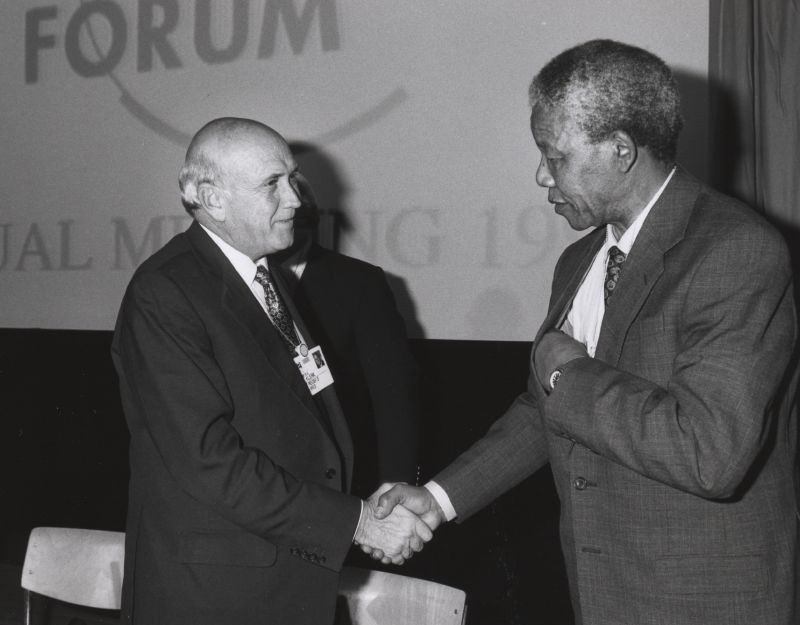News
Apartheid-Era's Last President, FW de Klerk, Was a Man at War With His History
FW de Klerk leaves a divided and contested historical legacy.

To many South Africans, FW de Klerk was the last white leader of the apartheid state who changed tack to save his image as the Struggle closed in on the old order.
To the traditional Afrikaner nationalists, he is the “verraaier” who sold out the cause of racial separation and capitulated to the ANC.
Finally, to pragmatists — a minority in today's feverish political discourse — De Klerk was a man who turned away from the straight-jacket of his past and did the right thing when asked to make a rational decision about the future of his country.
Facing mounting global pressure, a rapidly growing internal protest movement, the effects of economic sanctions and declining support for conscription among young white South Africans, De Klerk faced a choice: dig in and fight to the bitter end with diminishing resources and in the face of international opprobrium — or accept that it was time to dismantle the apartheid edifice.
De Klerk surprised his fellow National Party leaders, the nation and the world when he firmly chose the latter course and announced the unbanning of the ANC and SACP and the release of Nelson Mandela on 2 February 1990.
The words which he uttered, coming as they did after a decade of states of emergency and a repression-dominated strategy under the leadership of his predecessor, PW Botha, were unexpected and stunned the nation with their lack of ambiguity and clarity:
“Only a negotiated understanding among the representative leaders of the entire population is able to ensure lasting peace.
“The alternative is growing violence, tension and conflict. That is unacceptable and in nobody's interest. The well-being of all in this country is linked inextricably to the ability of the leaders to come to terms with one another on a new dispensation. No one can escape this simple truth.
“On its part, the Government will accord the process of negotiation the highest priority. The aim is a totally new and just constitutional dispensation in which every inhabitant will enjoy equal rights, treatment and opportunity in every sphere of endeavour — constitutional, social and economic.”
It was a decision that was vehemently opposed inside the party, particularly by the defence minister, Magnus Malan, and other “securocrats” who were De Klerk's bitter enemies. But De Klerk had made a calculated gamble that most South Africans — black and white — would back him, isolating the extremists on both sides and building a new political middle ground.
He hoped, somewhat unrealistically given his party's history of minority rule and the vicious repression of the 1980s, that there was a political future for the National Party as a new centrist force drawing together support from the homelands and members of the coloured and Indian communities who had bought into the Tricameral Parliament — a vision that he would rope in Tim Bell, later of Bell Pottinger fame, to conjure.
But he knew that he was signing the death warrant of the system of apartheid and of white minority rule. It was an act that turned the tide of centuries of family history that was woven into the rise of Afrikaner nationalism.
As De Klerk put it in his autobiography, “The Last Trek, A New Beginning”, apartheid had been in his family's blood. Racial “self-determination” had been the dream of his father, Jan de Klerk, a senator and senior National Party official.
“It was the ideal to which I myself had clung until I finally concluded, after a long process of deep introspection, that, if pursued, it would bring disaster to all the peoples of our country — including my own.”
De Klerk's Afrikaner roots were deep and he was raised to remember them. Theunis Christiaan De Klerk had been one of five hanged by the British for treason in the 1815 Slagtersnek rebellion. Lourens de Klerk had participated in the Great Trek into Zulu territory. There he and the Voortrekker leader, Piet Retief, were invited by the Zulu leader Dingane to the great kraal where they were clubbed and stabbed to death — legend has it, after the Zulu monarch's famous cry, “Bulalani Abathakathi!”
His grandfather was captured during the South African War (known to Afrikaners as the Boer War) at the turn of the previous century when Britain sought to subdue the Afrikaner republics of the Orange Free State and Transvaal.
De Klerk basked briefly in the sunshine of his and Mandela's shepherding of a peaceful transition when the two were awarded the Nobel Peace Prize in 1993 on the eve of the first democratic election in April 1994.
De Klerk's family formed part of the conservative “Reformed Church” which was critical of the dominant Dutch Reformed Church because it allowed, amongst other things, the singing of hymns that deviated from the words in the Bible. He was a “Dopper”, as members of this orthodox church were known.
De Klerk described his first memory as that of “being carried on my father's shoulders surrounded by a mass of people. It was on the occasion of the laying of the cornerstone of the Voortrekker Monument in Pretoria in December 1938”. This seminal moment in Afrikaner nationalism and his family's strong ties with National Party politics meant that, as De Klerk put it, “politics was in my blood”.
His father's absence on political assignments and in the Senate meant that De Klerk was largely raised by his mother in an unsettled childhood that saw him change schools several times. His father's absence was felt, and it is to his mother that De Klerk attributed his self-confidence.
As a student in the Afrikaner Studente Bond, De Klerk showed a glimpse of his pragmatic, reformist side, inviting the ANC leader, Chief Albert Luthuli to address a student meeting.
But the burden of his conservative history made De Klerk an unlikely reformer and when he entered public life as a cabinet minister, he was regarded as being among the more conservative leaders in the National Party.
The party's internal politics were no rose garden. De Klerk's own father was on the cusp of becoming the country's ceremonial State President in 1967 when a smear campaign — “the distribution of an anonymous letter” — and his association with the Dopper church were used against him and he was defeated.
De Klerk's ascension to the position of leader of the National Party was paved with unsettling rightist views on race. When he was education minister, he oversaw attempts to cow universities into submission by cutting their budgets.
When PW Botha suffered a stroke, De Klerk threw his hat into the ring to succeed him as State President, eventually defeating the then Finance Minister, Barend du Plessis, in the race for the position in February 1989.
By August, Botha's hold on power had become untenable and De Klerk succeeded him as president. Expectations were that De Klerk would be a cautious and conservative leader who would plod on with the status quo — repression and mobilisation of the white community against a perceived communist threat.
Instead he pivoted decisively in the direction of reform and on 2 February 1990 — just six months after his appointment — he made the famous announcement releasing Mandela and unbanning the ANC. He did so against the wishes of party hardliners such as Magnus Malan, who preferred a heavier security solution, but had the support of Pik Botha, the Foreign Minister, and other moderates such as Dawie De Villiers.
One of his first actions was to begin the process of dismantling the country's six nuclear warheads, the first time that a sitting head of state has ever dissolved his country's nuclear capability.
On 24 October, he further alienated the right of his party when he signed a peace accord with national liberation movements and appointed the Goldstone Commission into the prevention of public violence and intimidation. The commission provided 47 separate reports to the government, many of which exposed security force involvement in violence.
Once he had chosen his course, De Klerk was relentless. In 1992, he appointed General Pierre Steyn as Chief of the Defence Force and asked him to investigate and report on the workings of military intelligence structures. The Steyn Report was damning in its exposure of malfeasance by military intelligence and, in what came to be known as “The Night of the Generals”, De Klerk responded by clearing out the military old guard, placing six top-ranking officials on compulsory early retirement and 16 on compulsory leave.
Steyn would serve as the newly democratic South Africa's first Secretary for Defence in the four years from 1994 to 1998.

De Klerk's manoeuvres against the military old guard did not prevent Nelson Mandela from labelling him as being ultimately responsible for security force atrocities, as the ANC attempted to dilute De Klerk's emerging stature as the man who ended apartheid.
De Klerk and Mandela's relationship would be complicated, with the two famously clashing at the Codesa talks to end apartheid, when the latter blamed the former for orchestrating the Boipatong Massacre in which security forces collaborated with hostel dwellers to kill anti-apartheid activists.
In a move that signalled a desire to move the talks forward, De Klerk appointed the young reformer, Roelf Meyer, as chief negotiator at talks on a new constitution. Meyer and the ANC's chief negotiator, Cyril Ramaphosa — later president — established a strong bond, and when the National Party unambiguously adopted the view that unqualified majority rule would characterise the future of the country, a deal was reached and apartheid's death warrant was finally signed.
De Klerk basked briefly in the sunshine of his and Mandela's shepherding of a peaceful transition when the two were awarded the Nobel Peace Prize in 1993 on the eve of the first democratic election in April 1994.
But acrimony set in once more as the election campaign got underway.
In terms of the temporary constitutional arrangement after 1994, De Klerk served as a Deputy President to Mandela, alongside Thabo Mbeki, who would become the second democratic president.
As the opposition Democratic Party (later the rump of today's Democratic Alliance) began to make headway with its strong public stance against the ANC government, De Klerk found himself in a politically compromised position as a member of Cabinet. The National Party's traditional support base began to migrate to the more familiar anti-ANC rhetoric preached by the DP's Tony Leon, and De Klerk began to be viewed as a sell-out.
He withdrew from the government of national unity, but it was too late and the NP soon dissolved, with members going their separate ways by 2001 with some joining the ANC in government and others departing for the DP.
De Klerk's path to isolation from the traditional streams of South African politics began and, although still celebrated abroad for his role in ending apartheid, he entered the final years of his life in relative political isolation at home.
In reality, De Klerk was a complex person at war with his history and open to misrepresentation.
At a National Party meeting on the eve of the democratic election, De Klerk had quipped: “Those are my principles, and if you don't like them, I have others.” As a callow young political reporter, I viewed this as the mutterings of a man without an ethical centre.
Years later, I discovered that he had been mischievously quoting Groucho Marx.
This article originally appeared on Daily Maverick
Photo: Wikimedia Commons


